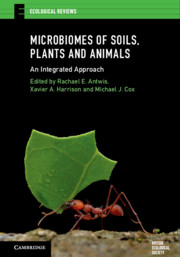Book contents
- Microbiomes of Soils, Plants and Animals
- Ecological Reviews
- Microbiomes of Soils, Plants and Animals
- Copyright page
- Contents
- Contributors
- Preface
- Abbreviations
- Chapter One Microbiomes of soils, plants and animals: an introduction
- Chapter Two Analytical approaches for microbiome research
- Chapter Three Microbiomes of soils
- Chapter Four Factors that shape the host microbiome
- Chapter Five Microbial symbioses and host nutrition
- Chapter Six The microbiome and host behaviour
- Chapter Seven Host microbiomes and disease
- Chapter Eight Adapting to environmental change
- Chapter Nine Microbial biotechnology
- Chapter Ten Synthesis and future directions
- Index
- Plate Section (PDF Only)
- References
Chapter Nine - Microbial biotechnology
Published online by Cambridge University Press: 07 March 2020
- Microbiomes of Soils, Plants and Animals
- Ecological Reviews
- Microbiomes of Soils, Plants and Animals
- Copyright page
- Contents
- Contributors
- Preface
- Abbreviations
- Chapter One Microbiomes of soils, plants and animals: an introduction
- Chapter Two Analytical approaches for microbiome research
- Chapter Three Microbiomes of soils
- Chapter Four Factors that shape the host microbiome
- Chapter Five Microbial symbioses and host nutrition
- Chapter Six The microbiome and host behaviour
- Chapter Seven Host microbiomes and disease
- Chapter Eight Adapting to environmental change
- Chapter Nine Microbial biotechnology
- Chapter Ten Synthesis and future directions
- Index
- Plate Section (PDF Only)
- References
Summary
Microbes provide a diverse source of functional traits that can be used to address a whole range of human and environmental problems, from agriculture and farming, to human and wildlife health, and energy production and climate change mitigation. Although microbes and their derivatives have been used for decades in some contexts, recent advances in sequencing and other technologies have allowed us to identify and understand novel sources and applications. Here, we review a range of different types of microbial biotechnology, including probiotics or microbial inputs, prebiotics, enzybiotics, microbiome transplants, antimicrobial peptides and secondary metabolites, across a range of contexts including human health, agriculture, biofuel production and wildlife disease, among others. We discuss the advances made in these fields, along with the complexities and problems associated with success. We also comment on ethical issues surrounding the use of microbial biotechnology and areas of policy and risk assessment that will need to develop to promote safe implementation.
Keywords
- Type
- Chapter
- Information
- Microbiomes of Soils, Plants and AnimalsAn Integrated Approach, pp. 182 - 221Publisher: Cambridge University PressPrint publication year: 2020
References
- 1
- Cited by

